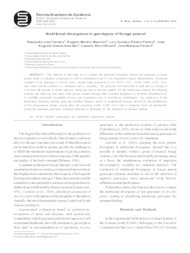Nutritional divergence in genotypes of forage peanut.
Nutritional divergence in genotypes of forage peanut.
Author(s): Ferreira, A. L.; Maurício, R. M.; PEREIRA, L. G. R.; Azevedo, J. A. G. de; OLIVEIRA, L. S.; Pereira, J. M.
Summary: The objective of this study was to evaluate the nutritional divergence between ten genotypes of forage peanut, based on chemical composition as well as fermentation and in vitro degradation kinetic characteristics. Treatments consisted of ten genotypes of Arachis pintoi, namely eight accessions (31135, 30333, 15121, 31828, 15598, 31534, 13251 and 31496) and two cultivars (cv. Belmonte and cv. Amarillo). The genotypes were harvested in each plot at a height of 3 cm from the ground, in 42-day intervals, during the time of heaviest rainfall. For the multivariate analysis the following variables, the following were used: crude protein, neutral detergent fiber, potential degradation in 48 hours, degradation rate of insoluble potentially degradable fraction and degradation rate of non-fibrous carbohydrate. The application of the hierarchical clustering analysis, using the Euclidian distances matrix of standardized averages allowed for the identification of five homogeneous groups. Among them, the accessions 31828, 31534, 15121 and cv. Belmonte stood out nutritionally among the remaining genotypes evaluated, depicting as promising for the utilization in ruminant feeding.
Publication year: 2012
Types of publication: Journal article
Unit: Embrapa Dairy Cattle
Observation
Some of Embrapa's publications are published as ePub files. To read them, use or download one of the following free software options to your computer or mobile device. Android: Google Play Books; IOS: iBooks; Windows and Linux: Calibre.
Access other publications
Access the Agricultural Research Database (BDPA) to consult Embrapa's full library collection and records.
Visit Embrapa Bookstore to purchase books and other publications sold by Embrapa.

